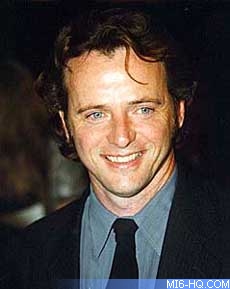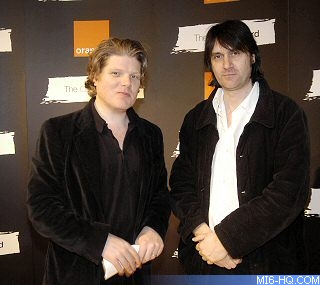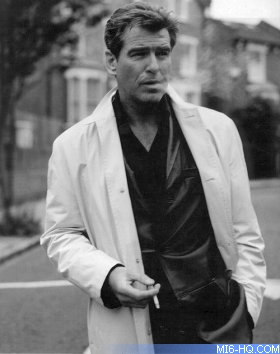 |
| |
MI6 got to attend "The Orange Word" Screen
Writers Season 2004, and can bring you the full transcript
from the interview. In this in depth talk Neal Purvis
and Robert Wade discuss Bond, their careers, loves
and pet hates of film...
|
|
Interview - Neal Purvis and Robert Wade (Part
4)
15th April 2004
MI6 got to attend "The Orange Word" Screen Writers
Season 2004, and can bring you the full transcript from the interview.
In this in depth talk Neal Purvis and Robert Wade discuss Bond,
their careers, loves and pets hates of film...
Continuing...
Peter Florence: The film you've currently been working
on, which we're going to see the very first rough cut of, you've
been working on for a very long time haven't you?

Above: Connie Nielsen |
|
Robert Wade: Yes, this is a film called Return
to Sender, it's currently called Return to Sender, but it
probably won't be called that when it comes out - if it
comes out. We wrote it, I think we first started writing
it 14 years ago.
Neal Purvis: Yeah it was when we were researching
Let Him Have It that we found that there was a con man in
England who would follow cases at the Old Bailey and if
anyone got, was going to be getting the chop, he'd (and
as I said, they're only in prison for three months, interestingly
enough) ...
Robert Wade: We had a policy when we were hanging
people that if they didn't get executed within three months
the sentence would be commuted to life imprisonment because
the British Government considered it inhumane to keep someone
on death row longer than three months. That was back in
the 40s.
Neal Purvis: Not that we're criticising America.
Robert Wade: No,
|
Neal Purvis: But yeah, no someone, this con man would
contact the person on death row, well British death row and he
would pretend to be someone from that person's past and the person
would be so desperate that he'd research it, and it would be feasible
that he might know them, he would be so desperate that he would
say yes I remember you and they'd have some communication and
then once the person got hanged, he'd go to the pub next to Wandsworth
prison and auction the last letter to the press, so that was in
the 50s
Robert Wade: And we thought this was a terrible thing
but very interesting and we didn't want to do another depressing
British period piece so we looked across the Atlantic and saw
that they were still executing people.
Neal Purvis: So this was, we started doing it about
14 years ago and when we wrote it we said that it was the first
female execution in Oklahoma for 40 years …
Robert Wade: But in between by the time we came to make
it …
Neal Purvis: Which was true.
Robert Wade: … which was true, I mean in one year
they executed three women…
Neal Purvis: In 2001 or 2002.
|
'... we didn't
want to do another depressing British period piece...'
Peter Florence: Would you like to tell us what
we're going to see?
Robert Wade: So eventually we got the money together
to make it and a Danish Director called Bille August who
made Pelle the Conqueror (he won an Oscar for that), the
Danish actress called Connie Nealson who's actually quite
a successful American actress but she is Danish and Aiden
Quinn and it's quite interesting it it?
Neal Purvis: But just to say that there's no proper
sound on it, there's no proper music and …
Robert Wade: They only finished shooting on Saturday
…
Neal Purvis: But this is made up from things that
they shot.
|
|

Above: Aidan Quinn
|
Robert Wade: I think this was a tape that was made
to sell the movie at the American film market
'I think the whole
budget is less than the pre-title sequence of Tomorrow Never
Dies...'
Neal Purvis: Well it is, yeah.
[clip of Return to sender shown]
Peter Florence: That's a thrilling scene. The hook is
absolutely brilliant.
Neal Purvis: Well we hope so.
Robert Wade: I mean it's funny you have something being
so old and finally getting, I think it's fantastic. It's an old
script and …
Neal Purvis: Mm, I mean it was written as a spec script
which our agent tried to sell 12 years ago and it almost sold
at MGM until Laddy, Alan Ladd junior who was head then, he decide
that is was morally repugnant, wasn't it?
Robert Wade: Yeah that's right, I mean he's right.
Peter Florence: You start with a lawyer and a journalist
so moral repugnance is going to be in there quite strongly. Presumably
the journey is towards …
Neal Purvis: It is a tale of redemption, but for us
it's very exciting because it shows that something isn't dead
until it's been shot.
Robert Wade: Yeah. But it was in the days when we didn't
have deadlines wasn't it, I mean we had …
Neal Purvis: Yeah
Robert Wade: Oh it took us years and years and we got
through a few directors on it …
Neal Purvis: Five.
|

Above: Robert Wade & Neal Purvis
|
|
Robert Wade: Really? But it's just a thing which
is true about things is that if you keep going long enough
then a script that is, you know it was a good script and
I hope it's going to be a good film but it's now got made
because we kept going.
Peter Florence: It's also got made presumably
because now you've made two movies, which between them
grossed a billion dollars and you are, you have in some
sense the power to get it made.
Robert Wade: No I don't think that's got anything
to do with it but what it means …
Neal Purvis: You'd think that that would be the
case but it doesn't work like that.
|
Robert Wade: It did mean that we didn't have to get
it made. I think when you're starting out, above all you want
credit, you want to get a movie made so you will take whatever
people come and maybe they might not be - I mean I'm not saying
that about anything that we've done - but we were able to say
well we don't want to do it with this person but we will do it
… we had control because we weren't desperate to get it made.
Peter Florence: We now have time for questions from
the audience and we will I promise you be screening at the end
of this an action sequence from Die Another Day
Floor Questions...
|
Floor Question One: I'd just like to start off
the questions from the audience with one that was texted
in from an admirer of London who wants to know how easy
writing Johnny English was having started with Bond.
Robert Wade: Well we were adamant about not making
a James Bond spoof because it's sort of contained within
the genre itself so we said to Rowan Atkinson we only want
to sort of go into the Graham Greene sort of territory.
Peter Florence: A Graham Greene spoof rather than
an Ian Fleming spoof.
Robert Wade: No, you know, maybe not so commercial
but more interesting to us but something happened and we
weren't able to carry on with it and it ended up being a
James Bond spoof. Is that right?
Neal Purvis: Yeah, I mean it really wasn't, and
it was embarrassing for us to a certain extent because our
intention, I mean you can't do the James Bond and write
a Bond spoof, you can't do that.
Peter Florence: No I think because it holds within
it its own…
|
|

'... it was embarrassing
for us to a certain extent ...' |
Robert Wade: It's not interesting, it's a boring thing
to do so we were sort of trying to go down a certain road and
it was more about the kind of end of Empire and everything and
then basically September 11th happened and suddenly, our plot
had been about some spies who had nothing to do sort of conspiring
to re-hang the iron curtain …
Robert Wade: … and that seemed suddenly terribly
unfunny so it had to be, it had be re-changed and we couldn't
do that because we were doing the Bond film so it was a really
difficult situation. What they did was they took the scenes that
we had written and they put it into a much less controversial
or sort of cynical plot …
Neal Purvis: And both films …
Peter Florence: Closer to Bean and the Barclay Card
ads.
Robert Wade: Yeah, I mean that's the funny thing about
it, but it, you know I think it's sort of, it is funny but it's
like a Bond spoof. For instance we had him in a Bristol, which
is you know very end of Empire British car and now he's in an
Aston Martin.
Floor Question Two: I get the impression with the Bond
movies that you two are quite keen to do a more Fleming-esc movie
but market forces are dictating that that's not possible, is that
a fair assessment, particularly of Die Another Day?

Above: Die Another Day, UK Quad (2002)
 Buy
Now £9.99
Buy
Now £9.99
'...I think it's
Fleming-Ian is the term actually, because it's got the
Ian in it...' |
|
Peter Florence: What's Fleming-esc
Neal Purvis: Well …
Robert Wade: I think it's Fleming-Ian is the term
actually, because it's got the Ian in it. I think that you
couldn't do a straight Fleming adaptation. I mean they did
do it and that was of its time but I don't think you could
do that now because the Bond movies sort of became a different
thing and that's what people expect.
Neal Purvis: Well I suppose you would like to
do a totally dark one possibly but that's not what the film
is, it's for the whole world you know, it just can't be
like that. It's got to entertain and there are so many expectations
now. I mean if you did a low budget Bond movie set in the
50s you might be able to.
|
Robert Wade: Which wouldn't be low budget would it?
Neal Purvis: I mean a small story, but you know I mean
we're not unhappy but I think the first half of Die Another Day
is quite Fleming-Ian.
Floor Question Three: Have you ever felt that you wanted
to move into directing films as well as writing them?
Neal Purvis: Well we've had a deal at Working Title
for several years now and we've never got around to actually doing
anything. The problem is, is that you have to get up very early
to do… I mean they get up at 5 and …
Robert Wade: Well we were going to do a night shoot
of a movie just shot at night about the schizophrenic guy and
we were going to direct…
Neal Purvis: I mean we did think, I mean we do, a performance
was shot by Donald Camel and Nick Roe with them turning up on
alternate days and you know I think there's a lot to be said for
that.
|
Robert Wade: But the thing is that you get into … you
have to deal with actors all the time as a director and
there's, you know …
Floor Question Four: What is Bond as a character
like to write for?
Robert Wade: Well it's very difficult in the sense
of everyone has an expectation of the character but the
essential thing about the character is that he doesn't give
away much about himself and he doesn't externalise his feelings
so if you're going for … the Fleming books are really
interesting because they're underneath the surface of the
character and cinema isn't like that, so especially with
a character who doesn't express his emotions, you're constantly
struggling to suggest them. I think Pierce Brosnan is very
good at suggesting a kind of undercurrent there without
it becoming self indulgent.
Peter Florence: An undercurrent of what?
Robert Wade: Mm sort of there's a shadow over
this man, you know, although he enjoys what he does, it's,
there is sort of death always kind of running along side
him. I don't know if that's noticeable.
|
|

Picture:
Maxim Fashion
'...the character
is that he doesn't give away much about himself...' |
Peter Florence: What about what you've done with his
relationship with M because Judi Dench gives Bond possibilities
that one never had when we had a male controller?
Neal Purvis: Well I think they did it really well in
GoldenEye is where it was set up and it's sort of become a little
bit cosy now between the two of them.
Robert Wade: Well we did eh, didn't she get, you know
he shot her through the shoulder didn't he in the virtual reality
sequence of the last film, so we were trying to do something different
there but it has got a bit cosy.
Neal Purvis: Yeah, I mean we tried to make John Cleese
a bit more like Q was when he first started with Bond, because
again that had become very cosy and …
'...we shot her in the
last one, I mean and then she had kissed him...'
Peter Florence: Is there a danger of the breaking down
of this cosiness?
Robert Wade: Well I think the danger is that it becomes
a bit soapy if you keep having these characters all the time.
Peter Florence: How can it be a bit soapy, he's had
a relationship, or not had a relationship with Miss Moneypenny
for 35 years for goodness sake?
Peter Florence: Is there a danger of the breaking down
of this cosiness?
Robert Wade: Yes, well we shot her in the last one,
I mean and then she had kissed him but that turned out to be virtual
reality as well so.
Floor Question Five: I notice that every time so far
that you've talked about something that you really like or that
you really admire or that you're fond of or esteem, fairly soon
afterward come the words 'but of course you can't do that now'.
I wondered whether this makes you at all unhappy?
Neal Purvis: Well mm, maybe you're right
Robert Wade: We should just turn out the lights and
…
Neal Purvis: Yeah.
Robert Wade: No, it's not like things were better in
the old days but it's just that you need, I think its all the
things that I really like I now think how the hell did they manage
to do that because now we've got some experience of how difficult
it is. Not just to get something made, but for it to be any good,
you know that's a huge thing.
Peter Florence: You particularly, with your relatively
unlimited budget for your imagination, if you said, to take a
very obvious example, we want to abseil down the biosphere, we
want to run the speed boat race along the Thames you can do any
of that, so turning it round, you now have possibilities and potential
that nobody ever had before don't you?
Robert Wade: That's right but it's actually not having
any limits to what you can do makes it more difficult to live
up to that.
Peter Florence: Do you also find it a particular challenge
that international terrorism is no longer solely the realm of
fantasy?
Robert Wade: Yes it's bad, you know it's very inconvenient
for us.
Stay tuned to MI6 for the rest of the the Neal Purvis and
Robert Wade interview.
Related Articles:
 Interview - Neal Purvis
and Robert Wade (Part 1)
Interview - Neal Purvis
and Robert Wade (Part 1)
 Interview - Neal Purvis
and Robert Wade (Part 2)
Interview - Neal Purvis
and Robert Wade (Part 2)
 Interview - Neal Purvis
and Robert Wade (Part 3)
Interview - Neal Purvis
and Robert Wade (Part 3)
 Interview - Neal Purvis
and Robert Wade (Part 5)
Interview - Neal Purvis
and Robert Wade (Part 5)
 MI6 "The World is Not Enough"
Coverage
MI6 "The World is Not Enough"
Coverage
 MI6 "Die Another Day" Coverage
MI6 "Die Another Day" Coverage
Many thanks to Peter Florence, Neal Purvis,
Robert Wade, Ellie Ward, The
Orange Word and The
British Library. Transcript courtesy The Orange Word. Image
courtesy Amazon Associates and The Orange Word